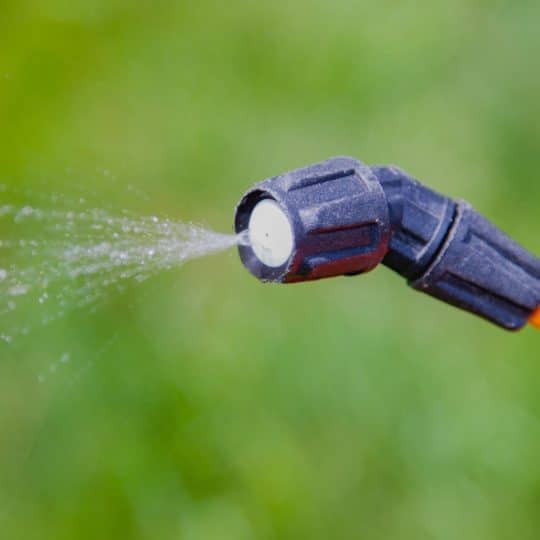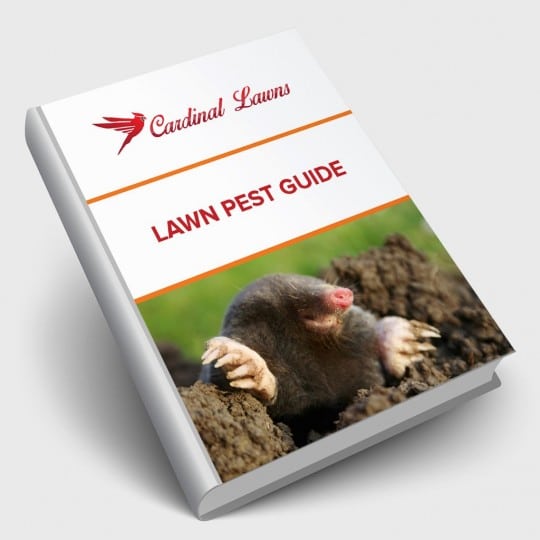Are Pesticides Safe for Pets and Children?
Posted
September 1, 2016

Many homeowners tolerate a few grubs in the lawn. But no one wants a backyard parade of nasty pests such as mosquitoes, fleas or ticks. Pesticides can provide crucial relief from harmful bug infestations. But how safe are these chemicals around pets and kids? Should you take extra precautions? Let’s take a look at what you need to know.
What is a Pesticide?
A pesticide is any substance or mixture of substances used to destroy, suppress or alter the life cycle of any pest. It can be a naturally derived or synthetically produced substance, or even an organism.
The Hazards of Pesticides
Pesticides can protect your health by destroying germs, animals, or plants that could hurt you. However, they can harm both people or pets. You might want to consider non-chemical methods first. If you do need a pesticide, use it correctly. Be especially careful around children and pets. They spend more time closer to the ground, where these chemicals are often applied.
The best pest control strategy is a comprehensive, multi-step attack that kills off pests at every stage of their life cycles (eggs, larvae, pupae and adults) and prevent future problems. Proper disposal of pesticides is also important – it can help protect the environment.
Are Cardinal Lawn’s Pesticides Safe for Pets and Children?
Legally, no lawn pest control material may be classified as “completely safe.” But our weed and insect controls are deemed “practically non-toxic,” which is the lowest toxicity classification for a pesticide. All of our products are registered for use on residential lawns. They contain many of the same active ingredients as the products you can buy at a local home and garden store. We believe our pest control treatments present less of a threat to your family and pets than chemicals you might try to spray on yourself. Why? Because they are applied only by our licensed specialists, and in strict compliance with labeled instructions.
Protect your loved ones from harm by following the directions on any pesticide label word for word. Or, if you hire a pro, follow their advice carefully. Generally, you’ll need to keep pets and family members off any treated surface until it is dry (about one to two hours).
Natural Options for Pest Control
When you are starting a garden or designing a landscape, choose native plants appropriate to your geography and soil type. Native plants will naturally repel many common pests. They also will reduce the propagation of invasive exotic species. Regularly mix compost into your garden soil, too. This will provide natural aeration and promote growth of beneficial bugs that will eat the bad ones.
Non-chemical pest control methods can be effective in certain situations. Take beneficial nematodes, for example. These microscopic wormlike creatures are available for sale in boxes at your local garden store. They are a good option to eliminate backyard fleas, Japanese beetles, and other pests, because they feed on them. And they won’t hurt pets or people.
Regular Lawn Maintenance Repels Pests
Keeping your yard well maintained will go a long way in controlling pests. Insects love to hide and reproduce in tall grass, weeds, and piles of leaves and debris. Mow the lawn regularly. Remove weeds and clutter when you can. By eliminating these areas, you will reduce the number of unwanted insects on your property, and you’ll have a prettier lawn, too.
Call Cardinal Lawns for Safe Pest Control
Call Cardinal Lawns today at 614-808-4446 to find out more about how our various pest control programs can help you and your family stay protected from pests.

Download Your FREE Lawn Pest Guide
Pests become most prevalent during the heat and humidity of summer. Take some time to learn about the signs of infestations before any damage can be caused to your landscape. This handy guide will teach you how to spot common lawn pests and how to keep them from causing harm to you and your property.